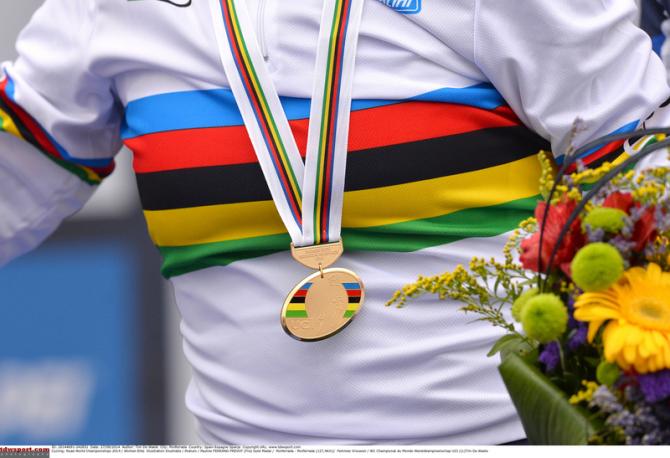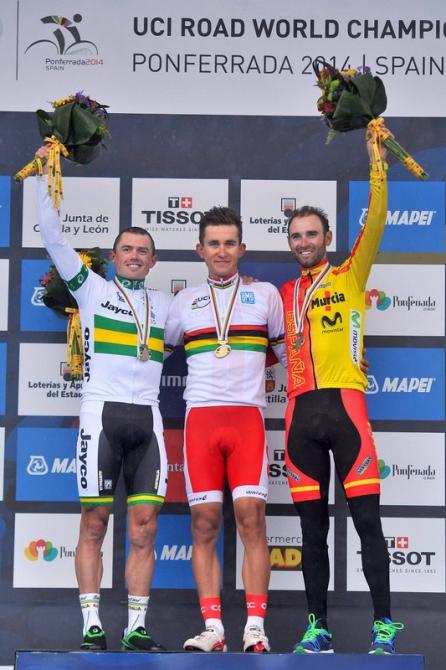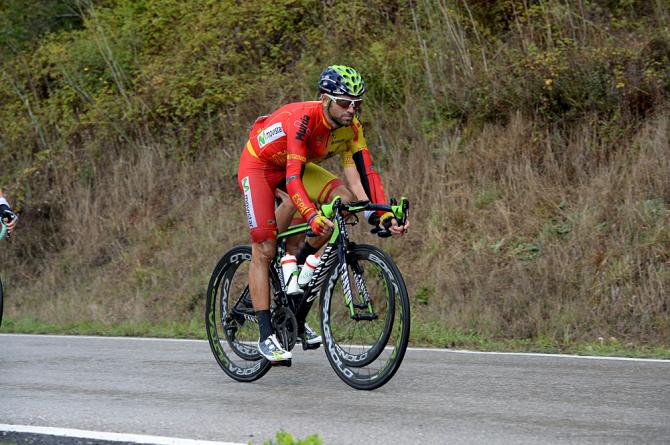Top 10 conclusions from the road World Championships
Part 2: Kwiatkowski, 'boring races', missed opportunities and home advantages



Future is bright for Kwiatkowski
It was only a matter of time before the Polish rider scored a major one-day win but few tipped Michal Kwiatkowski as a favourite before the race started. However, his tactical execution and delivery were as cunning as they were flawless. Phase one was roping his rivals into a malaise of security as a wave of his team peeled off after controlling the opening laps, while his second effort was to unleash an attack of poise and penetration that caught the field napping.
Having finished in the top five in all three Ardennes Classics earlier this spring, the blueprints of success, on a course many likened to one of the spring races, were already there and perhaps it wasn’t a complete surprise to a see a reshuffled Liege-Bastogne-Liege podium in Ponferrada.
Where the 24-year-old goes from here is perhaps the biggest question he and his bosses at Omega Pharma face ahead of their season de-brief on October 16. It’s great problem to have when, like Kwiatkowski, you don’t have a particular niche as a rider but with that comes the issue of prioritisation – a factor that may have seen the Polish rider's dip in form at the Tour de France.
Whether Kwiatkowski can push on and target a three-week Grand Tour next season is open to debate – even a giddy Patrick Lefevere has called for patience, but should that be the aim, he and his team must build a programme around tailored to such lofty ambitions.
This year Kwiatkowski peaked at several points in the lead-up to the Tour but looked drained by the time July came about. It’s not just about race days: Kwiatkowski has raced as much as Marcel Kittel this season (70 days), one more day than Vincenzo Nibali (69), and four more than Nairo Quintana (66), but the new world champion must decide on his precise targets. Lefevere has told Cyclingnews that Kwiatkowski has the ability to win every one-day race from San Remo to Lombardia (withstanding Roubaix) and few would argue with such a bold statement, but it can’t be done in one season. Just as Kwiatkowski showed in Ponferrada, picking your moments and your battles are often the key to success. (DB).
Let me entertain you
Get The Leadout Newsletter
The latest race content, interviews, features, reviews and expert buying guides, direct to your inbox!
Much has been said about the negative tactics at the end of the women’s road race on Sunday, but the other talking point has been whether the race was boring and if it was a bad advert for women’s cycling. One thing that most people seem to agree on is that, like the other road races at the weekend, not a lot happened for most of it. But was it a symptom of women’s racing or just the course?
It became clear early on in the road racing programme that the Ponferrada course was not as tricky as many first expected, and the two climbs were not enough to make for a selective race.
In terms of racing, there was little to report from the early stages of the women’s race, but a huge crash decimated the group. With so many riders being forced out of the race at such an early stage, and bike changes left right and centre, the race stagnated somewhat. You can’t blame the lack of early action totally on this incident, but you cannot disregard it either.
The race did eventually pick up on the penultimate lap with an attack from Alison Powers (USA). It seemed to ignite something in the rest of the peloton and attacks continued to come. It had the distinctive air of a mid-Tour de France transitional stage, as the majority of the peloton look to save their legs for something better.
The racing was in stark contrast last year’s road race in Florence. The American and Italian teams set such a high pace in the opening laps that only a very elite group remained with three circuits still to run. They were helped by the harshness of the course, which was one of the toughest in recent years.
Who knows what next year’s race will hold? Boring races are as much a part of cycling as boring matches are in football. You can bring together two of the best teams in the world and they can end up cancelling each other out and giving you a 0-0 draw. Two years ago we were hailing the women’s road race at the Olympic while dismissing the men’s event as a snore-fest. You win some, you lose some.
Races are dependent on a multitude of factors, course, weather, riders’ form, individual teams’ tactics and a pinch of the unexpected. They are not gender dependent, with plenty of men’s races throughout the year making you reach for the remote control. Thankfully though, there are plenty of interesting and tactically proficient races in both men’s and women’s cycling, or we wouldn’t watch it. If you get one bad apple do you throw away the whole bag? (SO)
A missed opportunity for the sprinters
Several of the best sprinters in professional cycling winced in pain and disappointment as they crossed the finish line in the elite men's road race in Ponferrada last Sunday, knowing that they had missed the chance of becoming world champion.
Alexander Kristoff (Norway) won the bunch sprint but it was only for seventh place, not for the rainbow jersey. The sprinters finished seven seconds behind Michal Kwiatkowski and even closer to the five late attackers who managed to stay away on the fast descent to the finish.
In the same group as Kristoff were John Degenkolb (Germany), Nacer Bouhanni (France), Ben Swift (Great Britain), Sonny Colbrelli (Italy), Michael Matthews (Australia) and many of the other pre-race favourites including 2013 winner Rui Costa, Rigoberto Uran and Edvald Boasson Hagen.
After a controlled race, most teams, including Italy, believed the world title would be decided in a sprint and rode defensively on the last lap. Kwiatkowski's lone attack threw a spanner in the works and the late attacks over the top of the Mirador climb also stretched the peloton. However several sprinters, teams and coaches no doubt asked plenty of questions when they realised how close they had gone to winning.
Bouhanni probably asked why Tony Gallopin went in the break instead of helping him. Perhaps Swift asked if Pete Kennaugh could have been more useful helping him on the final lap instead of spending so long in a breakaway with Visconti. Perhaps Kristoff asked if Boasson Hagen and Nordhaug could have helped him that little bit more instead of finishing with him in the front group.
These are questions raised with the help of hindsight but the answer is that just seven seconds, a hundred metres out on the road, separated the sprinters from a shot at winning the rainbow jersey. (SF)
Home advantage?
A total of 36 medals, over 12 events, were awarded throughout the week-long world championships in Ponferrada. Australia took home the most, with eight, while home nation Spain only pocketed one. Alejandro Valverde’s bronze medal in the men’s road race was the only time that any of the Spanish team climbed up onto the podium. Outside of that, the nation only ventured into the top 10 on two other occasions, with Movistar’s sixth in the team time trial and Jonathan Castroviejo’s 10th in the individual event.
The last time that Spain hosted the Worlds in Madrid, 2005, the country took home three medals, all of them silver medals. Valverde finished second in the road race, while Ivan Gutiérrez and Joane Somarriba took theirs in the time trials. Aside from this brief medal rush, however, Spain’s record in the world championships has been relatively poor. Over the past decade they have taken home an average of one medal a year, with Valverde claiming half of them.
The dearth of medals isn’t for lack of talent. Spain look set to top the WorldTour rankings for the third year running, while Movistar should take home the team prize for the second consecutive season. In the individual rankings, Valverde is fighting it out with current leader Alberto Contador to ensure yet another Spanish rider finishes the year as number one. On the women’s side, Spain is not quite as dominant with the country just nudging into 37th in the world rankings. However, with the men so dominant, their performances at the Worlds are glaring.
Spain’s problem is where their specialties lay. The have a string of top-level climbers and Grand Tour riders but little in the way of pure one-day specialists and sprinters. In a country where the Vuelta is king, Oscar Freire was a rarity and without him the country has been struggling.
Valverde is one of the few current crop that straddles both Grand Tour and one-day categories, helped by the strong sprint he possesses. Joaquim Rodríguez has snatched up the remaining medals in the road race, but the Katusha rider needs a much more selective course to prevail. The much highlighted inter-team rivalry has also played its part in the failure to find gold in the road race.
Medals in the time trial category have been even harder to come by. Since the days of Miguel Indurain and Abraham Olano in the 1990s, Gutiérrez’s in Madrid is their only one. Castroviejo has been their most consistent performer in recent years, but the 27-year-old’s best performance to date was his 10th place in Ponferrada.
With no new one-day or time trial talent appearing on the horizon, Spain may be waiting a little while longer to move up the medal table. (SO).
Preparation, preparation, preparation
For the second year in a row, a world champion has been crowned on the back of an unorthodox approach to the world championships. Those who preached the old adage that the Vuelta provided the best form builder would have felt rather sheepish when the top two medallists stood on the podium: the winner having competed in the Tour of Britain and the runner-up deciding to fixate on two one-day races in Canada. In fact only three of the top 10 started the Vuelta in August.
It goes to show that methodology in preparation of form is both adaptive and variable. Next year the consensus on the best preparation may vary to an even wider degree. With a course in North America for the first time since 2003, riders and teams will have to balance programmes that could see potential victory candidates race and train through August and September in North America, instead of taking more traditional paths. This could have a knock on effect on Tour de France participation for some of the best one-day riders as well. The fact that the team time trial has been shortened to less than 30 kilometres could also alter schedules and rosters.
Read Part 1 of this Top 10 Road Worlds Conclusions feature.